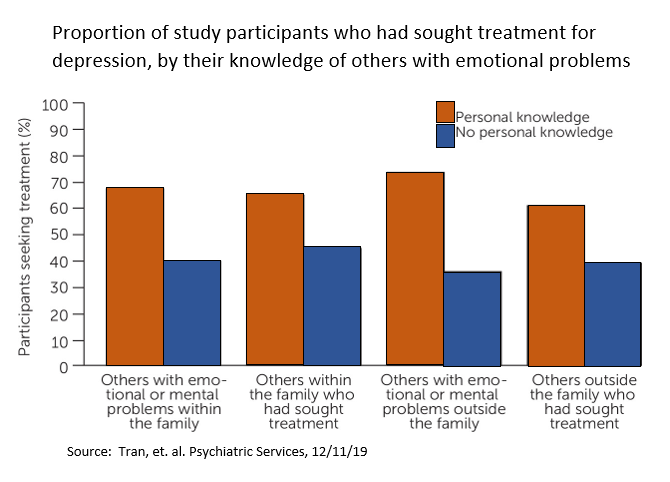Knowing about Mental Health Concerns of Friends and Family Members Reduces Stigma and Encourages People to Seek Help
A new study highlights the value of people sharing their mental health problems and treatment with friends and family. When people know a friend or family member with a mental health illness, they are more likely to recognize and understand their own mental health issues and seek treatment, according to study from researchers from Palo Alto University in Palo Alto, California.
The study looked at people screening positive for depression and whether they were more likely to have sought treatment if they had personal knowledge of others with mental/emotional problems or who had sought treatment for them. They found that, after controlling for stigma, social support and demographic variables, people who had friends or family members with emotional problems or mental illness were more likely to seek treatment for their depression.
In addition to the challenges of the conditions themselves, depression or other mental illnesses can carry significant social burdens, such as shame and stigma, the authors note. Self-stigma and perceived stigma about mental health can negatively affect understanding and acceptance of mental health concerns. Perceived stigma, or public stigma, refers to the negative attitudes held by the public about people with mental illness. Self-stigma is when people internalize these negative stereotypes about themselves, often leading to lowered feelings of self-worth, greater isolation and more difficulty coping and recovering.
Previous research has found that having a friend or family member that shares about their mental health issues increases knowledge and improves attitudes about mental health and one’s own emotional problems. This study looked at the likelihood of people taking action to get treatment. The graph shows the proportion of study participants who had sought treatment for depression, by their knowledge of others with emotional problems.

Having a friend or family member who has shared about their mental health problems, “may carry unique importance for treatment seeking beyond other well-studied social factors such as social support and perceived stigma,” the researchers note. Aside from age, “personal knowledge was the sole consistent predictor of greater odds of treatment seeking.”
The authors conclude that “given the pervasive undertreatment of depression, with fewer than half of individuals with depression receiving care, any effort to increase treatment seeking would benefit public health and help reduce suffering among individual with depression.” Sharing about one’s personal experience with mental health problems and treatment can normalize treatment, reduce stigma and help others to seek needed care.
References
Tran MM, Curland RA, Leykin Y. Association Between Treatment Seeking and Personal Knowledge of Others with Emotional or Mental Problems. Psychiatric Services. Published online Dec. 11, 2019.
Corrigan, PW and Rao, D. On the Self-Stigma of Mental Illness: Stages, Disclosure, and Strategies for Change. Can J Psychiatry. 2012 Aug; 57(8): 464–469.
